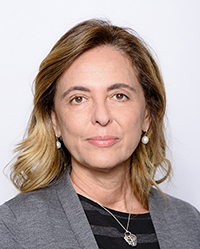2 mars 2023: Pre Federica Sallusto
12H30
CMU - AUDITOIRE FRANCESCHETTI (c150)
suivi d'un apéritif
Hôte: Pr Doron MERKLER & Pr Simone BECATTINI,
Centre de recherche sur l'inflammation/Geneva Centre for inflammation &
Département de pathologie et immunologie/Department of Pathology and Immunology
Faculté de médecine UNIGE
prof. fEDERICA sALLUSTO
Professor of Medical Immunology at the Institute of Microbiology, ETH Zurich and
Group leader of the Cellular Immunology Laboratory at the institute for Research in Biomedicine, Università della Svizzera italiana, Bellinzona

«T lymphocyte differentiation: lessons learned from patients with inborn errors of immunity»
Federica Sallusto1,2, Julia Puchan1, Marc Weisshaar1, Federico Mele2
1Medical Immunology Laboratory, Institute of Microbiology, ETH Zurich and 2Institute for Research in Biomedicine, Università della Svizzera italiana, Bellinzona
The immune response to and the clinical outcome of an infection is dependent on a variety of environmental and host factors. Studies in patients with primary immunodeficiencies have shown that the genetic variability has a strong impact on the clinical outcome and that even single-gene inborn defects of the immune system can cause severe diseases. These gene defects can affect the host immune response in multiple ways, including an impairment of T helper cell differentiation. In the context of collaborative efforts to understand how genetic mutations that underlie familial mycobacterial and fungal diseases (MSMD and CMC) functionally contribute to immune deficits, we are interested to delineate pathways and molecules that regulate human T cell differentiation and function. We are especially interested in studying mutations leading to specific deficiencies in the IL-17/Th17 and the IFN-g/Th1 pathways. A variety of approaches are being used to study T cells in immunodeficient patients and controls, from T cell cloning to single cell RNAseq and genome editing with CRISPR/Cas9. These studies can provide insights into human T helper cell differentiation pathways and identify new targets for immune intervention.
This work is done in collaboration with Jean-Laurent Casanova (Rockefeller University, New York, US) and Anne Puel (Imagine Institute, Paris, France)
Biography
Federica Sallusto is an expert in the field of human cellular immunology. Her research has focused on dendritic cell and T cell traffic, mechanisms of T cell differentiation and immunological memory. Among her contributions are the definition of “central memory” and “effector memory” T cells as memory subsets with distinct migratory capacity and effector function, the discovery of Th22 cells as a distinct subset of skin-homing T cells, the characterization of non-classic Th1 cells induced by bacteria and of two distinct types of Th17 cells with pro-inflammatory and regulatory properties. She also developed methods for the analysis of human naïve and memory T cell repertoires based on high throughput cellular screenings of expanded T cell libraries that has been instrumental to identify autoreactive T cells in patients with narcolepsy.
Federica Sallusto is currently Professor of Medical Immunology at the ETH Zurich and USI Lugano (joint professorship) and group leader of the Cellular Immunology Laboratory and Director of the Center of Medical Immunology at the Institute for Research in Biomedicine in Bellinzona. She is member of the German National Academy of Science Leopoldina, of EMBO and of the Henry Kunkel Society, international member of the U.S. National Academy of Sciences and honorary member of the Swiss Society for Allergology and Immunology. In 2022 she was honored with the title of Doctor honoris causa of the Faculty of Science and Medicine of the University of Fribourg. She is currently president of EFIS (European Federation of Immunological Societies).
2 mars 2023